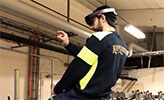News
-
AI can detect the spread of fake news

A correct quote or truthful image can suddenly be turned into false propaganda. Extremely small modifications are enough to change the entire meaning. Örebro University Professor Mehul Bhatt, together with an international team, is researching how...
-
Örebro research providing robots with eyes

Technology from Örebro University will help autonomous robots to work remotely with challenging tasks. This knowledge is instrumental in the production of underwater robots.
-
Saab: “A great way to get started”

As part of the AI.MEE project Corob, AI researchers at Örebro University have worked together with Saab to teach robots to communicate. “We’ve had a kickstart,” says Göran Backlund at Saab.
-
Örebro University offering tuition-free AI courses for furloughed employees

To counteract the consequences of the COVID-19 pandemic, the government is now investing a total of SEK 160 million in short courses and lifelong learning. A significant component of the initiative is the AI courses for working professionals that Örebro...
-
“Wastewater must be free of antibiotic-resistant bacteria”

His research team was the first in Sweden to find bacteria resistant also to new types of antibiotics in waterways and lakes. Now, Faisal Ahmad Khan is presenting his doctoral thesis in biology at Örebro University. “Limiting the prescription of...
-
Challenge: Get computers to paint like your favourite artist

From raw data to “draw data”. At least that is the goal of Deep Art Challenge. Using AI technology, computers will generate pictures in the same style as the participants’ favourite artists.
-
Improved flavour of herbs and vegetables grown in greenhouses with UV light

“Plants cannot choose to stay out of the sun or use sunscreen. Instead they produce substances that protect them from the sun’s UV light. These substances have an effect on flavour, colour and nutritional value,” says Örebro researcher Victor...
-
Kulturkvarteret is now taking shape – as a digital twin

As Örebro’s new centre for music and arts, Kulturkvarteret, takes form, Örebro University is putting together a digital copy of the physical building. “The digital twin will benefit both visitors and facilities management,” says Jesper Hedlund at...
-
New visiting professor – excellent addition to AI research

“Artificial intelligence has to be able to both reason and learn new things. What I particularly like is that Örebro University is strong in both these areas. I’m looking forward to further collaboration with researchers here”, says Luc De Raedt, new...
-
More efficient training using AR: “AI can further improve the system”

This past autumn, Kopparbergs Brewery has tested a training method that uses augmented reality, AR. The next step is to add a layer of artificial intelligence, which will allow for individually-tailored training.
